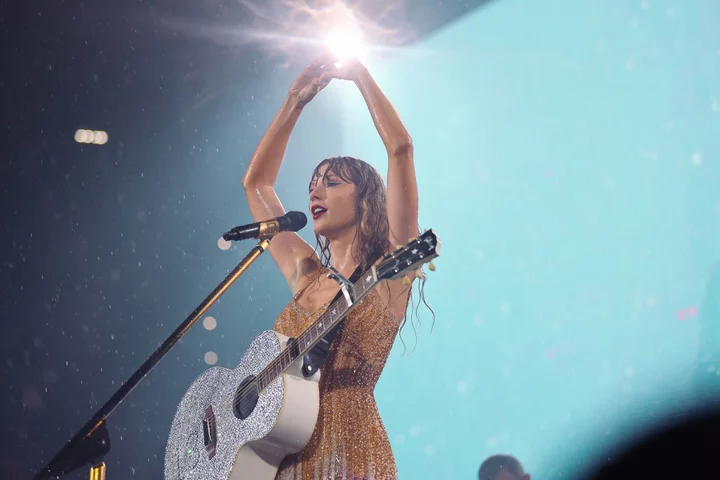For Taylor Swift fans, 52 concerts in massive football stadiums were never going to be enough to satisfy their pent-up demand to watch the superstar perform live for the first time since 2018. Some 14 million people flocked to Ticketmaster in hopes of scoring seats; the majority were unsuccessful.
With Swift’s so-called Eras Tour in full swing, millions of fans have had to learn how barter and secondary markets operate as they continue their quest for tickets using Facebook groups, reseller apps like StubHub and SeatGeek, and Twitter matchmaking accounts.
Swift will hold three events this weekend at MetLife Stadium in East Rutherford, New Jersey, and some of the cheapest tickets start at around $1,000 in the resale market. With a stadium capacity of 82,500, up to a quarter-million people will watch her perform in a single weekend.
The Swift tour provides a real-world lesson in the mechanics of supply and demand like no Milton Friedman textbook ever could. Much like Wall Street stockbrokers after a hot initial public offering, people who had scored multiple Swift tickets through Ticketmaster — you might call them scalpers; others prefer to think of them as capitalists — quickly found buyers for their assets. Most sellers were able to recover their initial investment and make a handsome profit, with some fans paying thousands of dollars for tickets that had originally sold for as little as $49 plus fees.
In Economics 101, that’s called demand inelasticity: Even as the price of a good or service rises, demand remains high. In this case, demand is fueled by pandemic savings as much as the carpe diem lifestyle of the post-pandemic era.
Read more: Welcome to ‘Swiftonomics’: What Taylor Swift Reveals About the US Economy
Swift has now played half of the Eras Tour concerts, and Bloomberg has reported that she is making more than $10 million per event, booking between $11 million and $12 million in ticket sales apiece.
The founders of “Eras Tour Resell,” a Twitter account that has garnered more than 150,000 followers by matching fans with sellers willing to trade verified tickets without a profit, have a front-row seat to demand levels. Real fans, they said, are willing to forego the markup when they have spare tickets.
In a secondary market dominated by scalpers and scammers, the face-value supply on their page comes down to 20 to 30 tickets per week on average. Prospective sellers often get more than 2,000 replies apiece, said Angel Richards, 27, one of the account administrators based in Connecticut. “The demand is very, very high.”
Bartering is another feature of Swiftonomics. One fan was only able to get tickets after posting a video on TikTok offering to trade seats for the use of the wedding venue she owns in Idaho, which usually goes for $4,000 a day. Another Swiftie who owns a pizza shop in Louisiana offered free pizza for a year in exchange for two tickets.
Others show up at concert venues ticketless, in the hope that resale prices drop closer to concert time. In many cases, they don’t.
In her hometown of Philadelphia, where Swift played three back-to-back shows earlier this month, demand was so high that thousands of fans — on top of some 70,000 inside the stadium — listened to the concert from the parking lot each night, according to local media.
If you go through the principles of price elasticity of demand, the demand side of the equation is still “pretty inelastic,” said Carolyn Sloane, an economist at the University of California at Riverside who teaches “Rockonomics,” which uses the music industry to explain the economy. For a lot of people, “it seems to be a real necessity.”
Swifties also offer important lessons on consumer resilience, something the US Federal Reserve has had to absorb over and over as it tries to cool the economy with 10 successive interest-rate increases in a little over a year.
Tickets for the Eras Tour originally went on sale in November, as the economy was showing early signs of cooling and recession odds were mounting. Rising prices and tighter credit conditions are making some Americans more discerning in their purchases, but many economists are surprised that consumers aren’t more squeezed at this point.
“They’ve surprised us more times than anyone would care to admit, coming out of the pandemic,” said Shannon Seery, an economist at Wells Fargo & Co. The spending that took place over a decade after the Great Recession occurred in just two post-pandemic years, she said.
Pockets of the economy have indeed cooled since November, and some consumers are increasingly turning to credit cards to make ends meet. Others are straight-up tightening their belts.
But Swifties and their willingness to splurge have proved powerful enough to lift local economies. Two Las Vegas concerts helped boost local tourism back to pre-Covid levels in March, and cities from Atlanta to Boston have also seen a spike in hotel and restaurant bookings when they welcomed the Eras Tour.
A 2021 Oxford Economics study commissioned by Ticketmaster’s parent company, Live Nation Inc., found that for every $100 an out-of-town fan spent on a concert ticket, the local economy benefited from an additional $334 in consumer spending. And many Swifties are spending way more than $100.
“Is supply and demand broken? No, it’s working perfectly right,” said Sloane, who uses Swift as an example in her economics classes. “There’s just so much scarcity, there’s so much more demand relative to supply.”

